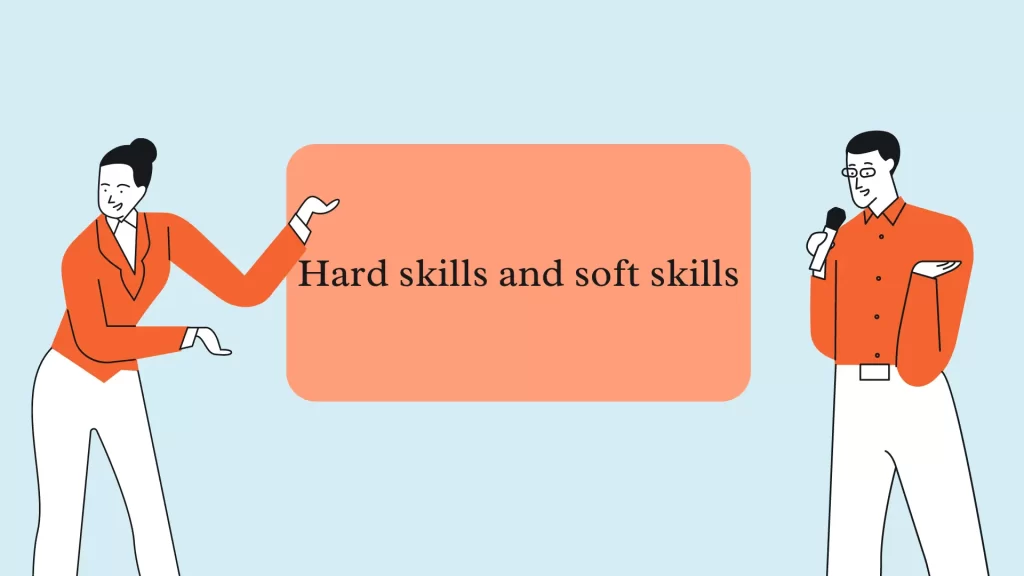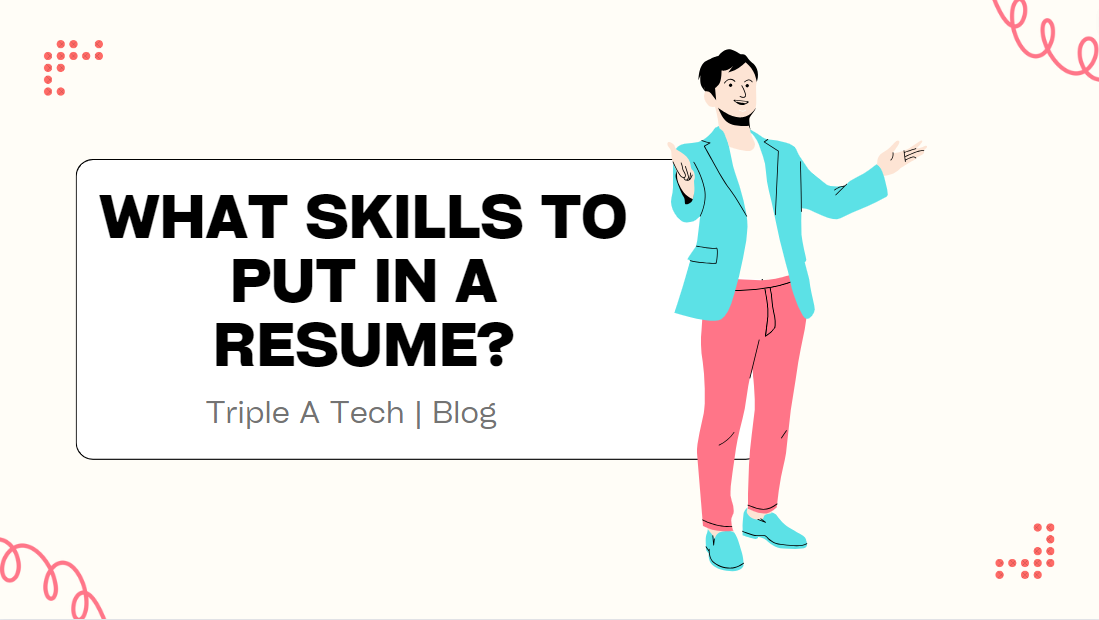As a fresh graduate or someone entering the workforce for the first time, crafting a compelling resume can be challenging for them. With little to no professional experience, you may wonder what skills you should include to make yourself stand out from the competition.
While your resume will certainly evolve and grow as you gain more experience, several key skills are universally valuable and should be included in your resume as a fresher.
You can exhibit both your potential and your ability to contribute to the organization from the start by displaying these skills. This article will examine the essential skills that can significantly improve your chances of securing your dream job as a new employee. It is important to have skills. And your resume will be your initial point of contact with most employers. As a result, how you present your abilities on your CV may make or break your job hunt.
Everything you need to know is right here:
- Hard talents vs. soft skills.
- The best resume talents.
- How to List Qualifications on a Resume.
- A list of abilities for various occupations.

Let’s understand the key difference between hard skills and soft skills.
There are two fundamental skill types:
The talents or knowledge required to execute certain work activities are referred to as hard skills. Writing software code, driving a certain type of car, and scheduling social media postings are all examples of difficult talents.
Soft skills are the characteristics and characteristics that define how you operate and interact with others. Soft talents include things like time management, inspiring people, and being interested.
You’ll need a combination of soft and hard abilities for each job, and you should highlight both on your Resume or CV. Hard talents are quite straightforward: either you have them or you don’t.
They’re also easier to demonstrate and include on a resume than soft abilities. Meanwhile, soft skills are more subjective—for example, everyone’s idea of a good leader differs. However, if you utilise the proper strategies, you may still include them on your resume.
What are the basic skills you need to get a job in 2023?

Technical Skills: Employers often seek candidates who possess technical skills relevant to the job. These skills can vary depending on the industry and the specific position you are applying for. For example, if you are looking for a job in the field of IT, proficiency in programming languages, database management, or network maintenance can be highly advantageous.
If you have completed any relevant coursework, internships, or projects during your academic career, be sure to include them in this section. If you have certification in any software programs or specific technical skills, mention them as well. This demonstrates your ability to handle technical challenges and quickly adapt to new technologies.
Communication Skills: Effective communication is crucial in any job, regardless of the field. As a fresher, you should emphasize your verbal and written communication skills on your resume. Mention any presentations you have given or group projects you have worked on that required effective communication skills.
Highlight your ability to articulate ideas clearly, listen actively, and collaborate with others in a team setting. Excellent communication skills are highly valued by employers, as they contribute to a positive work environment and efficient workflow.
Problem-Solving and Analytical Skills: Being a quick thinker and problem solver is a valuable asset in any job. Highlight any experiences where you successfully tackled challenges or resolved issues. This could include academic or extracurricular projects, internships, or any situations where you had to demonstrate critical thinking and analytical abilities.
Demonstrate how you approached a problem, analyzed different options, and implemented a solution. Employers seek candidates who can identify problems, think critically, and offer innovative ideas to benefit the organization.
Leadership Skills: Even as a fresher, you may already possess leadership skills gained through academic projects, student organizations, or volunteer work. Employers value candidates who can take initiative and lead a team effectively.
Include any instances where you successfully led or managed a group, such as being a project leader or serving in a leadership role in a student organization. Highlight your ability to motivate and inspire others, delegate responsibilities, and achieve collective goals.
Adaptability and Flexibility: In a fast-paced and ever-changing work environment, adaptability and flexibility are highly desirable skills. Employers want to know that you can handle unexpected situations and quickly adjust to new circumstances.
Highlight examples where you successfully adapted to changes, handled multiple tasks simultaneously, or took on new responsibilities outside of your comfort zone. Demonstrating your willingness to learn and grow will show employers that you are a valuable asset to their organization.
Time Management and Organization: Being able to manage your time effectively and stay organized is crucial in any job. Employers seek individuals who can prioritize tasks, meet deadlines, and remain productive.
Include any experiences where you effectively managed your time, such as juggling coursework, extracurricular activities, and part-time jobs. Mention any systems or techniques you used to stay organized and maintain efficiency.
Interpersonal Skills: Strong interpersonal skills are highly valued by employers, as they contribute to a positive work environment and effective collaboration. Highlight your ability to work well with others, resolve conflicts, and maintain professional relationships.
Mention any group projects, volunteer work, or extracurricular activities where you had to collaborate with others. Showcase your ability to communicate effectively, show empathy, and work as part of a team towards a common goal.
How to list skills on a resume?
You’ve seen several samples of some of the top resume talents above. You must need them. Now, let’s go through how to properly use skills on a resume in detail.
Adapt your resume talents to the job description you’re aiming for.
If there is one takeaway from this, it is this-
“Customize the abilities list on each CV you send to meet the needs of the position.”
You’ll demonstrate to recruiters that you’re tailor-made for this position and outperform resume-screening machines that scan resumes for relevant keywords.
How do you create a resume skills list that is suited to the job description?
- Begin by making a comprehensive list of all your professional talents. Make a list of everything that makes you successful in your profession, including both hard and soft talents.
- Carefully read the job description. Pay close attention to the job ad’s “Requirements” or “Key Skills” section.
- Look for terms and phrases like “meticulous time management,” “knowledge of XYZ software,” “proficient in Lean management,” and so on. Make a note of them.
- Compare your master list of abilities to those listed in the job advertisement. All those who match must be included in your CV.
- Don’t just stop there! If the job posting asks for other abilities that you believe you have but did not include in your master list, include them on your resume as well.
- Tell the truth about yourself and never use any language that shows disqualification and the recruiters will find out about it, so that’s why you should overstate your qualifications on a resume.
- You must include relevant skills in a separate section with bullet points. Because, In this manner, recruiters will be able to quickly identify your resume’s strengths.
Use a separate skills section to highlight your most essential qualifications. Make certain to: Use clear and exact language (“Written and verbal communication,” rather than “good communicator”). Divide the talents into two categories: “Hard Skills” and “Soft Skills.” Use no more than 10 different abilities in total.
- You can also point out how advanced your efficiency is, such as “Advanced Knowledge,” “Intermediate,” or “Basic.”
- Add a work history section with details of previous positions as proof of the skills list you’ve gained. Your skill set must be utilized in real-world professional scenarios to demonstrate your ability.
- However, after reading a 50-word essay, the recruiter already knows the prospect is qualified for this position.
So, What are the Top skills for a resume?
Every resume will require abilities relevant to the job you desire. To be a software engineer, for example, you must be able to code. However, the following are some examples of talents that may be useful in any career or industry:
Communication skills, Basic computer skills including Microsoft Office and PowerPoint, Management and leadership skills, Time management skills, Decision making, and problem-solving skills are mandatory for having a job anywhere in the world.
Do you know what the most desired skills are looked for by hiring managers?
The following are the top talents that companies look for on a resume:
Computer skills, programming languages, social networking, and corporate software are examples of technical talents.
- Problem-solving abilities include creativity, critical thinking, and analytical abilities.
- Skills in customer service include active listening, time management, and prioritization.
- Communication, collaboration, and empathy are examples of interpersonal skills.
- Leadership abilities include decision-making, stress management, and organizational abilities.
What are some good resume skills?
Because there are no generally good skills, there is no conclusive solution to this issue. It all relies on what you know and can accomplish, as well as the abilities that companies are searching for. To nail the job, read the job description and highlight the keywords you’ll subsequently match with your CV.
If you’re looking to shift careers, focus on transferrable talents that are equally applicable to the position you’re going for. If this is your first resume and you don’t have much job experience, do the same but with a mix of excellent employability abilities.
So You have to be very careful in following these terms:
- Include your strongest talents in a resume summary or aim. It is one of the most vital sections of your resume, so you should highlight carefully. Recruiters pay close attention to every detail, so do yourself a favor and be specific.
- Use the PAR method to create your accomplishment statements while writing your job experience section. In that manner, you’ll discuss how you achieved the outcomes, revealing your skill set.
- Create a skills list in the form of resume bullet points that are suited to the job description.
Final words
In conclusion, it is crucial to include the most relevant and impressive skills on a resume to grab the attention of employers. If you can showcase skills such as leadership, communication, problem-solving, adaptability, and technical expertise, you can significantly increase your chances of getting a job and proving your potential value to prospective employers.
So as a fresher, your resume should emphasise transferable skills and demonstrate your potential to succeed in the job. While you may not have significant professional experience, if you take proper knowledge and highlight these essential skills can significantly enhance your chances of securing your dream job. Keep in mind, to tailor your resume to each specific job application, showcasing the skills that align with the position requirements. Your first job and career launch are within reach with a well-crafted resume that highlights your skills and potential.




